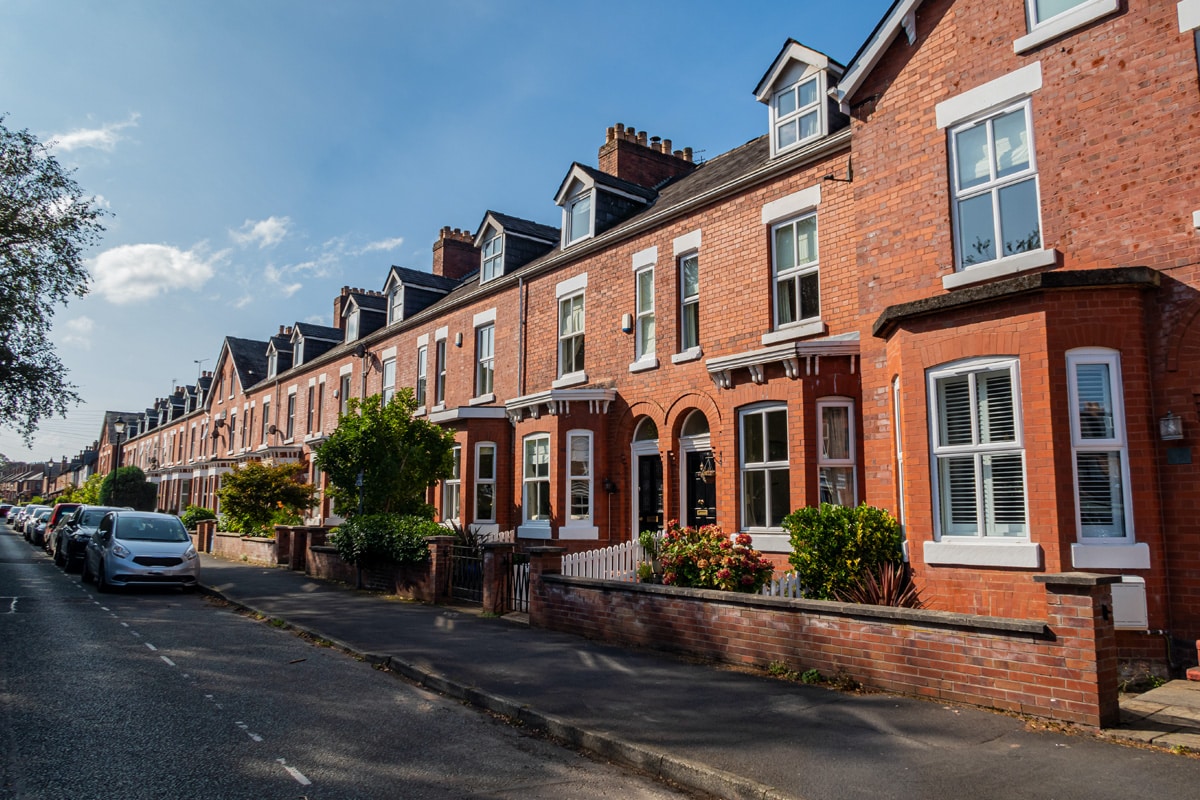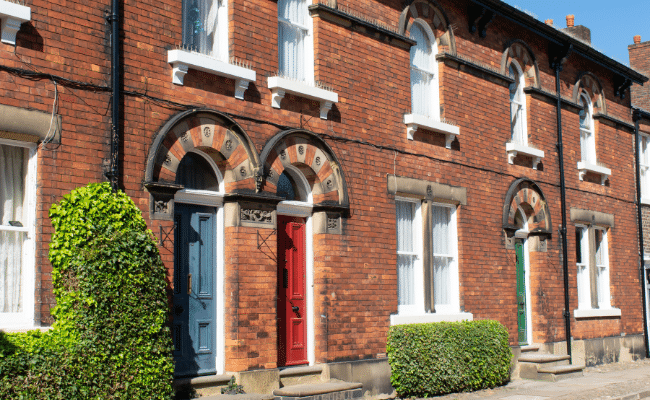20 Cheapest Places to Buy a House or Flat in Manchester
Manchester's most affordable postcode is M11 (Clayton/Openshaw) with average asking prices of £203,630, sitting 18% below Manchester's average sold price of £249,608.
And the question that comes up constantly: no, there are no houses under £100,000 in Manchester anymore. The cheapest postcode averages £203,630. If your budget is under £150,000, you'll need to look at Greater Manchester towns like Wigan or Bolton instead.
Using the latest HM Land Registry sold prices and current asking prices from estate agents and the UK's best property websites, we've identified Manchester's 10 most affordable postcodes where buyers can find genuine value. Seven areas offer average asking prices under £235,000, with the cheapest starting from £203,630 in Clayton.
Manchester remains 14.5% cheaper than the England average of £291,852. Sold prices range from detached houses averaging £469,658 to flats at £195,757, with the best value concentrated in eastern suburbs like Clayton and Gorton, and northern areas including Blackley and Cheetham Hill.
Our analysis reveals affordability ratios from 4.89x to 7.22x in Manchester's cheapest areas, comfortably below the UK average of 7.1x. Properties in M50 (Salford Quays) cost just 4.98 times the local average household income of £44,300, making homeownership more achievable than most of England.
This guide focuses on price and affordability. For rental yields and investment returns, see the Manchester rental yields guide including the full investment picture including regeneration and market trends.
Exploring other UK regions? Check our guides on the cheapest places to live in Birmingham, lowest house prices in London, most affordable areas in Wales, and the cheapest regions across England.
Article updated: January 2026
Manchester's Most Affordable Property Markets 2026
Analysis of Manchester's 10 cheapest postcodes reveals genuine value for first-time buyers and investors, with prices ranging from 18% to 6% below Manchester's average sold price of £249,608.
- Cheapest places to buy a house in Manchester: £203,630 (M11, Clayton/Openshaw) to £233,099 (M38, Little Hulton) across the 10 most affordable postcodes
- No houses under £100k: Manchester's cheapest postcode now averages £203,630. For sub-£150k properties, look to Greater Manchester towns like Wigan (£183,770) or Bolton
- Cheaper than England average: All 10 locations are 20% to 30% below England's average house price of £291,852
- Affordability ratios: Price-to-income ratios range from 4.89x (M17) to 7.22x (M38), with most areas below the UK average of 7.1x
- Best areas to buy on a budget: Eastern suburbs (Clayton, Gorton, Ardwick), northern areas (Blackley, Harpurhey), and Salford districts (Pendleton, Eccles, Little Hulton)
Contents

-
by Robert Jones, Founder of Property Investments UK
With two decades in UK property, Rob has been investing in buy-to-let since 2005, and uses property data to develop tools for property market analysis.

Property Data Sources
Our location guide relies on diverse, authoritative datasets including:
- HM Land Registry UK House Price Index
- Ministry of Housing, Communities and Local Government
- Ordnance Survey Data Hub
- Propertydata.co.uk
We update our property data quarterly to ensure accuracy. Last update: January 2026. All data is presented as provided by our sources without adjustments or amendments.
Are There Houses for Sale in Manchester Under £100k?
No. As of January 2026, there are no postcodes with average property prices under £100k for standard residential properties within Manchester's M postcodes.
The cheapest postcode, M11 (Clayton/Openshaw), now averages £203,630. Even M18 (Gorton), which held the cheapest spot for years, has risen to £207,115. The days of sub-£100k terraces in east Manchester are gone.
On occasion there may be a singular outlier property at auction being listed with a below £100k, but it is not common and no guarantee it will sell anywhere near that price.
What about houses under £50k? These don't exist in Manchester outside of auction lots requiring complete renovation, or properties with serious structural issues. If you're seeing anything advertised under £100k, check carefully. It's likely shared ownership, a parking space miscategorised, or a property that needs £100k+ of work before it's habitable.
If your budget is strictly under £150,000, you'll need to widen your search to Greater Manchester towns where you have many more options:
- Wigan — Average sold prices £190,937, with terraces regularly available under £130k
- Bolton — Victorian terraces from around £120k in areas like Farnworth and Little Lever
- Rochdale — Average sold prices around £202,316, with Metrolink access to Manchester city centre
For auction properties, which occasionally appear below £100k even in Manchester, you'll need cash or bridging finance and should budget 20-30% of the purchase price for renovation. See our deals on below market value properties for options available now in the current market.
Top 20 Cheapest Places to Buy a House in Manchester
Based on January 2026 asking prices, these Manchester postcodes offer the lowest entry points for buyers. We've included price per square foot to help identify genuine value. If you're investing for rental income, check the yield data for each Manchester postcode before deciding.
| Rank & Area | Avg Asking Price | Avg Price per Sq Ft |
|---|---|---|
| 1. M11 (Clayton/Openshaw) | £203,630 | £252 |
| 2. M18 (Gorton/Abbey Hey) | £207,115 | £234 |
| 3. M6 (Salford/Pendleton) | £212,383 | £291 |
| 4. M17 (Trafford Park)* | £213,117 | £363 |
| 5. M50 (Salford Quays) | £220,706 | £364 |
| 6. M30 (Eccles) | £227,338 | £263 |
| 7. M31 (Partington) | £230,765 | — |
| 8. M9 (Blackley/Harpurhey) | £231,249 | £240 |
| 9. M12 (Ardwick) | £232,629 | £289 |
| 10. M38 (Little Hulton) | £233,099 | — |
| 11. M26 (Radcliffe/Prestwich border) | £233,215 | £255 |
| 12. M46 (Atherton) | £235,524 | £256 |
| 13. M5 (Salford/Ordsall) | £237,734 | £361 |
| 14. M40 (Collyhurst/Miles Platting) | £241,173 | £283 |
| 15. M27 (Swinton/Pendlebury) | £242,454 | £267 |
| 16. M8 (Cheetham Hill/Crumpsall) | £246,132 | £269 |
| 17. M43 (Droylsden) | £246,206 | £284 |
| 18. M13 (Longsight/Rusholme) | £248,302 | £297 |
| 19. M34 (Denton/Audenshaw) | £253,013 | £275 |
| 20. M35 (Failsworth) | £258,508 | £279 |
*M17 (Trafford Park) is primarily industrial/commercial. Residential properties are rare and data may reflect limited sales.
The price per square foot figures reveal where you get the most space for your money. M18 (Gorton) at £234/sqft offers significantly better value than M50 (Salford Quays) at £364/sqft, even though M50's headline price is only £13,591 higher. A £207,115 budget in Gorton buys roughly 885 square feet. The same money in Salford Quays gets you around 569 square feet. That's a difference of over 300 square feet.

How Affordable Are Manchester's Cheapest Areas?
Price alone doesn't tell you whether an area is affordable. A £200,000 house in an area where average household income is £30,000 is very different from the same price where incomes average £45,000. The affordability ratio (price divided by income) shows which areas genuinely offer value for local buyers.
| Area | Avg Asking Price | Household Income | Affordability Ratio |
|---|---|---|---|
| 1. M11 (Clayton/Openshaw) | £203,630 | £32,600 | 6.25x |
| 2. M18 (Gorton/Abbey Hey) | £207,115 | £33,400 | 6.20x |
| 3. M6 (Salford/Pendleton) | £212,383 | £37,000 | 5.74x |
| 4. M17 (Trafford Park)* | £213,117 | £43,600 | 4.89x |
| 5. M50 (Salford Quays) | £220,706 | £44,300 | 4.98x |
| 6. M30 (Eccles) | £227,338 | £39,500 | 5.76x |
| 7. M31 (Partington) | £230,765 | £33,100 | 6.97x |
| 8. M9 (Blackley/Harpurhey) | £231,249 | £34,400 | 6.72x |
| 9. M12 (Ardwick) | £232,629 | £32,700 | 7.11x |
| 10. M38 (Little Hulton) | £233,099 | £32,300 | 7.22x |
| 11. M26 (Radcliffe/Prestwich) | £233,215 | £37,600 | 6.20x |
| 12. M46 (Atherton) | £235,524 | £36,600 | 6.44x |
| 13. M5 (Salford/Ordsall) | £237,734 | £42,400 | 5.61x |
| 14. M40 (Collyhurst/Miles Platting) | £241,173 | £34,700 | 6.95x |
| 15. M27 (Swinton/Pendlebury) | £242,454 | £41,000 | 5.91x |
| 16. M8 (Cheetham Hill/Crumpsall) | £246,132 | £37,200 | 6.62x |
| 17. M43 (Droylsden) | £246,206 | £37,800 | 6.51x |
| 18. M13 (Longsight/Rusholme) | £248,302 | £32,000 | 7.76x |
| 19. M34 (Denton/Audenshaw) | £253,013 | £38,200 | 6.62x |
| 20. M35 (Failsworth) | £258,508 | £36,400 | 7.10x |
*M17 (Trafford Park) has limited residential stock. Data may reflect a small number of sales.
The rankings shift when you factor in local incomes. M17 and M50, which rank 4th and 5th cheapest by price, have the best affordability ratios (4.89x and 4.98x) because household incomes there are 30-35% higher than in east Manchester. M5 (Ordsall) also performs well at 5.61x despite ranking 13th by price.
At the other end, M13 (Longsight/Rusholme) has the worst affordability ratio at 7.76x. It ranks 18th by price but has the lowest household income of any postcode on this list (£32,000). For local first-time buyers, M13 is actually harder to access than several more expensive areas.
For comparison, the England average affordability ratio is around 8x. Every postcode on this list beats the national average, but the gap between 4.89x (M17) and 7.76x (M13) is significant. A household earning £35,000 could afford a property at 5x income (£175,000) but would stretch at 7x (£245,000).
This ratio matters for both homeowners and investors. For homeowners, it shows how achievable homeownership is on local incomes. For landlords purchasing investment property in Manchester, it helps assess tenant affordability and rental demand. If locals can't afford to buy, they rent. That's your tenant pool.
Understanding House Price to Income Ratios
The affordability ratio shows how many years of household income it would take to buy a property outright. For example, M11 (Clayton) at £203,630 with average household income of £32,600 gives a ratio of 6.25x. It would take 6.25 years of total household income to buy the property outright, before living costs.
In practice, lenders typically offer 4.5x income mortgages. So a household earning £32,600 could borrow around £146,700. Add a 10% deposit (£20,363) and they could afford roughly £167,000. That's still £36,000 short of M11's average price, which explains why many buyers need two incomes or larger deposits.
How Manchester's Cheapest Areas Compare
Manchester's cheapest 20 postcodes show affordability ratios ranging from 4.89x (M17) to 7.76x (M13). For context:
- Under 5.0x: Genuinely affordable. Only M17 (4.89x) and M50 (4.98x) qualify, both with higher-than-average local incomes.
- 5.0x - 6.0x: Below UK average. M6, M30, M5, and M27 fall here. Achievable for dual-income households.
- 6.0x - 7.0x: Around UK average. Most Manchester cheap areas sit here, including M11, M18, M9, and M40.
- Over 7.0x: Stretched. M38 (7.22x), M13 (7.76x), M12 (7.11x), and M35 (7.10x). Low local incomes make these harder to access than prices suggest.
The UK average is around 8x, and London exceeds 12x in many boroughs. Every postcode on this list beats the national average, but the gap between M17 (4.89x) and M13 (7.76x) is substantial. For investors, areas with better affordability ratios often see stronger owner-occupier demand, which can support capital growth.
First-Time Buyers: What Income Do You Need?
To buy in Manchester's cheapest postcode (M11 at £203,630), you'll need a household income of around £40,700 if using a standard 4.5x mortgage with a 10% deposit. That's based on borrowing £183,267 after putting down £20,363.
Here's how the numbers break down across the top 5 cheapest areas:
| Area | 10% Deposit | Income Needed (4.5x) |
|---|---|---|
| M11 (Clayton/Openshaw) | £20,363 | £40,726 |
| M18 (Gorton/Abbey Hey) | £20,712 | £41,423 |
| M6 (Salford/Pendleton) | £21,238 | £42,477 |
| M17 (Trafford Park)* | £21,312 | £42,623 |
| M50 (Salford Quays) | £22,071 | £44,141 |
*M17 (Trafford Park) has limited residential stock.
First-time buyers in England pay no stamp duty on properties up to £425,000, so every postcode on this list qualifies for full relief. Use our stamp duty calculator to check costs if you're buying a second property or investing through a company.
The median household income in Manchester is £34,700. That means even the cheapest areas require earnings above the local average, or two incomes combined. If you're buying solo on a typical Manchester salary, you'll likely need a larger deposit or to look at Greater Manchester towns where entry prices start closer to £180,000.
Cheaper Alternatives in Greater Manchester
If Manchester's M postcodes are still out of reach, Greater Manchester towns offer genuine sub-£200k options. These areas have their own guides with full postcode breakdowns, but here's how they compare:
| Area | Avg Sold Price | vs Manchester Avg | Transport to Manchester |
|---|---|---|---|
| Wigan | £190,937 | 23% below | 30 mins by train |
| Bolton | £198,401 | 21% below | 20 mins by train |
| Rochdale | £202,316 | 19% below | 15 mins by train |
| Tameside | £207,854 | 17% below | 15 mins by train |
| Oldham | £213,742 | 14% below | 30 mins by Metrolink |
The prices above are 'average' sold prices across all property types. These towns regularly have terraced houses under £150,000, £125,000 and even £100,000, something that no longer exists in Manchester's M postcodes. For first-time buyers priced out of Manchester, or investors seeking higher yields, they're worth exploring:
- Wigan buy-to-let guide
- Bolton buy-to-let guide
- Rochdale buy-to-let guide
- Tameside buy-to-let guide
- Oldham buy-to-let guide
The trade-off is commute time and, in some areas, slower capital growth. But if your priority is getting on the ladder or maximising rental returns, the numbers often work better outside the city.
Data source: HM Land Registry, October 2025.
Frequently Asked Questions
How much do you need to earn to buy a house in Manchester?
For Manchester's cheapest area (M11 Clayton at £203,630), you need a household income of approximately £40,700 to qualify for a mortgage, assuming a 4.5x income multiple and a 10% deposit. For the Manchester average price of £249,608, you'd need around £49,900 household income. Property investors typically require a 25-30% deposit, meaning a £203,630 property needs £51,000-£61,000 upfront. The median household income in Manchester is £34,700, which means even the cheapest areas require above-average earnings or two incomes combined.
What is the average house price in Manchester?
The average house price in Manchester is £249,608 based on October 2025 Land Registry data. This varies significantly by property type: detached houses average £469,658, semi-detached £317,089, terraced £245,862, and flats £195,757. Manchester's cheapest postcode (M11 Clayton) averages £203,630, while expensive areas like M21 (Chorlton) exceed £420,000. For comparison, see Manchester's most expensive streets.
Is it cheaper to live in Manchester or Birmingham?
Birmingham is slightly cheaper. Birmingham's average house price is around £235,000 compared to Manchester's £249,608, making Birmingham roughly 6% more affordable. Birmingham's cheapest areas also undercut Manchester's: B11 (Sparkbrook) averages around £180,000 versus M11 (Clayton) at £203,630. However, Manchester's job market, particularly in tech and media, may justify the premium for some buyers. For detailed Birmingham pricing, see our guide on the cheapest places to live in Birmingham.
Are house prices falling in Manchester?
Manchester prices are broadly stable with localised variation. Some city centre apartment-heavy postcodes (M1, M3, M15) have seen slight declines as the new-build market adjusts. Suburban family areas like M18 (Gorton), M11 (Clayton), and M40 (Collyhurst) show resilient demand due to regeneration activity and relative affordability. The cheapest areas covered in this guide have generally held value better than premium postcodes. For detailed market analysis, see our Manchester buy-to-let investment guide.
Which parts of Greater Manchester are cheapest?
Within Manchester's M postcodes, M11 (Clayton/Openshaw) is cheapest at £203,630, followed by M18 (Gorton) at £207,115 and M6 (Salford/Pendleton) at £212,383. Beyond the M postcode area, Wigan (£190,937), Bolton (£198,401), and Rochdale (£202,316) offer lower average prices with train connections to the city centre. These towns have terraced stock under £150,000 that no longer exists within Manchester itself.
